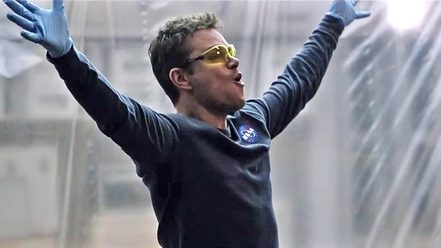
As far as putting out his particular brand of stylish genre films, Ridley Scott's eighth decade has been one of his most productive. In the last ten years, he's split his time between a California winery, 70's Harlem, feudal England, and deep space. Despite the quantity, the quality hasn't been up to the standard set by his earlier works. The venerable Scott returns to form with The Martian, easily his best film since the full version of Kingdom of Heaven. It finds him once again off the earth's surface, but he shirks the cold and claustrophobic space of Alien for the warmth of Thelma and Louise. Scott isn't known for capturing joy onscreen, but with The Martian, it's a welcome color on his palette.
The Martian spares no time getting straight into the action, as the film opens with a team of astronauts doing tests and taking readings on the Martian surface. The team, led by Captain Melissa Lewis (Jessica Chastain), has to suddenly take off in the midst of an encroaching windstorm, but in the attempt, some debris collides with team botanist Mark Watney (Matt Damon) and he is knocked unconscious. The blow disables his suit's telemetry, leading Lewis to conclude that Watney is dead and they are forced to leave him behind. However, thanks to a happy accident in which a scrap of metal kept Watney's suit sealed, the now-stranded astronaut wakes up on Mars and must solve a series of problems if he wants to stay alive.
Those problems on Watney's end, on the team's end, and on the relevant earthbound players' end, is what The Martian is primarily concerned with. This is a film devoted to the practical uses of science and engineering. Every problem has a solution, and it is highly entertaining watching smart people reason their way through. Mishaps occur, sometimes involving flammable or explosive or radioactive materials, but nobody's perfect. Back on earth, more smart people are devising ways to get Watney back home, and while these technical concerns are more opaque than Watney's elemental ones, Scott and writer Drew Goddard are able to communicate the long hours that go into the high-level math necessary to plot flight plans while not dwelling on the equations themselves. There's also the more sociological problems of how to tell the public about all this, or what NASA should tell Watney or the crew. A part of science is that every answer opens up two new questions, and The Martian never rests on one big solution. Everything has a contingency, and people always ask about the next step.
The obvious comparison to The Martian is Ron Howard's Apollo 13, and the usually colder Scott is at a much greater advantage in telling this story. Where Howard spent overlong chunks of time with the principals' families, Scott and Goddard only make allusions. He understands that this scenario is inherently dramatic and doesn't need goosing with spouses staring out at space or some personal demon for Watney to grapple with a la Gravity. The camera is always splitting between a space agency or a lab, Lewis's crew, or Watney on Mars. In keeping the focus on solving the next problem, the pace of the film never lets up.
The Martian also shares with Apollo 13 a deep cast. In addition to Damon and Chastain, the crew is made up of Kate Mara, Michael Pena, Sebastian Stan, and Aksel Hennie. The NASA team is led by Jeff Daniels, Chiwetel Ejiofor, Kristen Wiig, and Sean Bean, and they give orders to Donald Glover, Benedict Wong, and Mackenzie Davis. All are able to differentiate themselves and carve out a defining moment. No one is given a false moment, and everyone is able to exude some kind of competence, whether it's Daniels' firm hand on the tiller or Mara's no-nonsense mien on the spacecraft.
Damon is given the most time, and he ably carries the action on Mars. His Watney is a lived-in character, a guy who loves what he does and appreciates the challenge of seeing if he can do this. Like all characters, he never blurts out his backstory or resume like in an Aaron Sorkin script. The viewer understands that he's up to the task first by his mere presence on the mission, and then by his calm ability. He keeps his sanity by talking to the video recorder, and by making plenty of nerdy dad-jokes for his benefit and the viewer's. Scott and Goddard lean heavily on the technical, but don't forget the power of the visceral. In one of his best roles, Damon is also asked to do the most emotional heavy-lifting, and he comes through here as well. Watney maintains control of his emotions while he has control of his actions. In an affecting sequence, Watney has to give up control of his actions and surrender to the laws of physics, and he is finally able to let go of his emotions.
The Martian is a thrilling and entertaining film that will hopefully inspire thousands to STEM careers, but it's not without its faults. With big-budget filmmaking like this, Scott is in his wheelhouse, though some seams are showing. The Chinese, instead of the Russians, are eventually brought in, and I'm sure that was a completely organic decision by all involved and not an attempt to rope in the Chinese markets. The ending is fumbled, too, though a perfect one takes place a few minutes before the actual one. These small wrinkles don't detract from the overall experience of The Martian, a film that eschews sentimentality for the can-do optimism of bright people, and marks Scott's return to great filmmaking. A-
 RSS Feed
RSS Feed